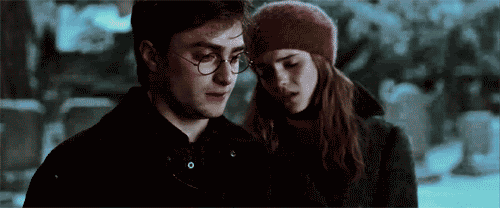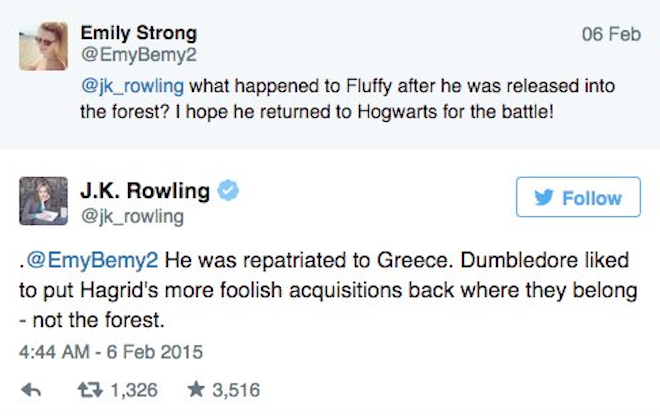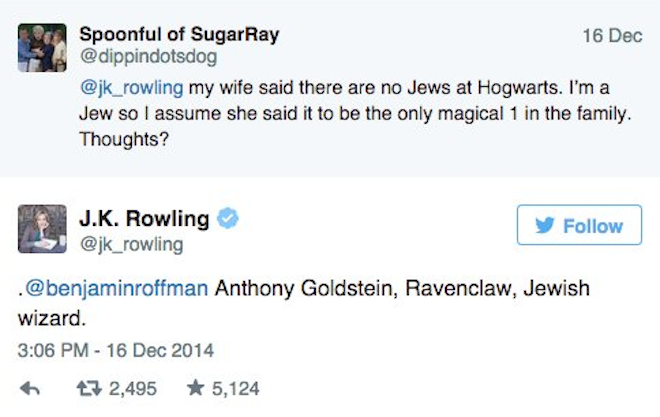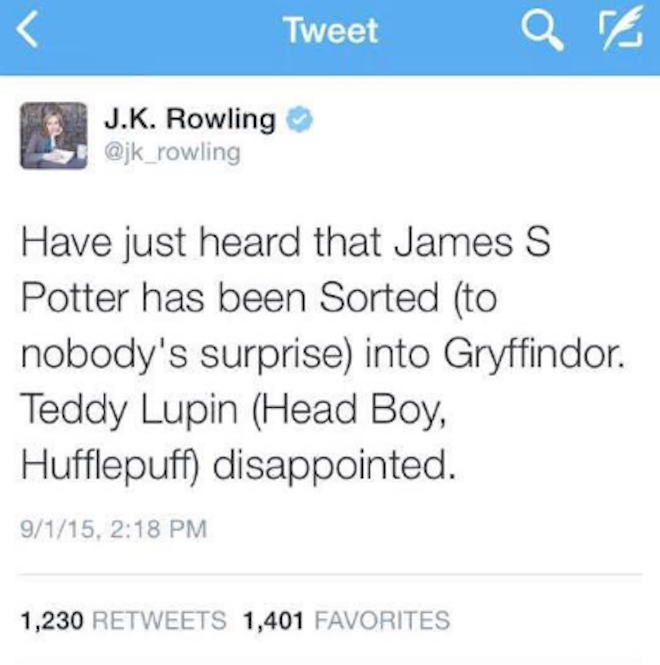Please J.K. Rowling, You’ve Given Us Enough
You've given us enough and now it's time to stop.

Last week several e-book retailer websites reported a startling and almost unbelievable fact: in September, there will be three new Harry Potter titles available for sale. The books will be a mixture of stories that have already appeared on subscription site Pottermore and will include “never-before-seen content” written by J.K. Rowling.
If this sounds bizarre to you, that’s probably because two weeks ago at the premiere of Harry Potter and the Cursed Child, J.K. Rowling specifically said that she was not going to write any more Harry Potter stories. Her exact quote is: “I think we’re done. No, Harry is done now.”
I am not a language analyst — hard to believe, I know — but to me that sounds pretty definitive. But of course, if you’re a fan of Harry Potter then you’ve always known one thing to be true: J.K. Rowling can’t let go of this universe (these books will revolve around prominent characters from Harry’s life, even if he’s not in them). It will never really be over. Rowling has proven that she’s incapable of stepping away.
–
“All Was Well” (Just Kidding, What Happens Next?)
In 2007, J.K. Rowling released Harry Potter and the Deathly Hallows, the last book in the series published ten years after The Philosopher’s Stone. It was great and everyone devoured it with abandon, a worldwide embrace of unbridled sentimentality (shout out to my first-year uni lecturers who ignored me reading the last book in class, thanks guys, by the by can someone explain political science to me?).
For Rowling, it was a solemn but cathartic moment. She was sad it was over, but was adamant that she knew always exactly what the last book would be about and couldn’t have changed it even if she had wanted to. She had finished the last ’19 years later’ chapter before the first book had even come out. It was just like ticking a (very engaging, very well-written) box.
“I’ve laid my clues and I’ve laid my plot and now I have to follow through with it,” she said to the UK’s ITV in 2005. “The final chapter, as I’ve always said, really relates to what happens to the people who survive the story, after the end of the story. And I have made small tweaks to it over the intervening years.”

The Boy Who Lived (again and again).
After the release of Deathly Hallows, a very British TV documentary called A Year In The Life followed Rowling’s complicated feelings about the end of the series and showed her trying to adapt to life after Potter (it included a number of scenes of her kneading dough and staring blankly at the Scottish countryside). One of the most interesting tidbits to come out of the show was that Rowling had already worked out the futures of all the surviving characters and to prove it, she drew a detailed family tree for the astonished interviewer.
“I can’t help it. It was like running a race and get to the finishing line and you’re running too fast to stop, so I do know what happens afterwards and I couldn’t stop my imagination doing that,” she explained, wearily. “It’s an awful lot of detail to go into for your own satisfaction and not because you’re planning on writing more books, but that’s how it was. I couldn’t stop. I had to know what happened next.”
It was interesting to see the usually media-shy Rowling like this; confident, determined and a little smug that she knew what happened to our favourite characters and we didn’t. It was in this interview that she first said on the record that Dumbledore was gay (“I told a reader that once and I thought she was going to slap me. I always saw Dumbledore as gay.”) prompting millions of pieces scouring the series for ‘clues’.
Back then she was fielding questions from readers who came up to her on the street. A few years later she joined Twitter and seemingly wished to answer every character question that was thrown her way (and by the by, she doesn’t like the idea that she should have left clues to Dumbledore’s sexuality).
.@anakocovic21 Maybe because gay people just look like… people?
— J.K. Rowling (@jk_rowling) March 24, 2015
For several years after Deathly Hallows came out, J.K. Rowling kept flipping between saying that it was “definitely time to stop now” (like in the above documentary), then casually mentioning that she would like to write a Harry Potter encyclopaedia, and then claiming that she didn’t know when she was going to write this, so don’t expect it any time this decade. She wrote some very English murder mysteries with no magic in them. It felt like Harry Potter really was finished — particularly when the last Harry Potter film had come out in 2011 — and that was okay! All was well.
And then in 2011, we got Pottermore.
Pottermore was going to be the home to all “Harry Potter-related projects” which to the world’s astonishment, meant that the story hadn’t finished. One of the many features of the subscription website was access to previously unreleased writing by J.K. Rowling and the surprise release of stories about the book’s characters again and again and again. These stories didn’t always change the original text dramatically, but it did start to feel weird that there was new material out there that not everyone had access to.
Of course the biggest new Harry Potter story had nothing to do with Pottermore. Harry Potter and the Cursed Child was released in book form earlier this month, presented as the ‘eighth Harry Potter story’ that explored Harry, Ron and Hermione’s lives as grown-ups. Some were thrilled just to get any new Hogwarts-related content, and others felt that in revisiting the heroes as downtrodden adults with adult problems, the story had lost its magic (sorry). Interestingly, in A Year In The Life, when talking about Albus Severus (who would be the star of Cursed Child) she pauses and says that he’s “the one I’m most interested in” — nine years before the play came out. She’d been planning it for a while.
Fantastic Beasts and Where to Find Them comes out this year — a film based on a Hogwarts textbook, which she wrote and released in 2001 — and it looks like one of the nods to the OG Harry Potter story will be the inclusion of a young Dumbledore. “A new era of magic begins!” the trailer says. It may not be about the character Harry Potter, but by using common characters it’s undeniably still part of his orbit.
This isn’t a new era; it’s just like adding an attic to an existing house.
–
Changing The Canon, One Tweet At A Time.
I am a Harry Potter fan — the dedicated, emotional, has-a-tattoo kind of fan — and like most Harry Potter fans, I feel very protective over the original books. I find it difficult to think about them critically because they are so tied to my childhood and sense of self that I can’t separate my own feelings from those on the page. Of course there’s stuff I’ve always wanted to know (what did the Dementors make Dudley Dursley see?) and things that I change in the version in my head (Hermione doesn’t do ANY boy’s homework!) but I’m fine with those ambiguities.
J.K. Rowling herself, seems less comfortable with ambiguities and is very keen to fill in the gaps whenever she’s asked questions about the series. In a very excellent interview with Oprah in 2014, J.K. admitted that she’ll never be able to stop thinking about the books, and writing new Harry Potter stories in her head.
“I don’t think you can [stop] when you’ve been that involved with the characters for that long. It’s still all in there,” she said. “They’re all in my head still. I mean I could write — I could — I could definitely write an eighth, ninth, tenth — I could — easily.”
“Will you?” Oprah asked. “I’m not going to say I won’t. I don’t think I will,” J.K. said. “I loved writing those books. I love writing it. So, I feel I am done but you never know.”
Of course, this necessity to keep adding details has irritated some fans. Even though the idea that Dumbledore was gay was a lovely one, and very much in keeping with the inclusive themes of the novel, critics argued that it would have been even better if she’d given the gay community that sort of representation in the actual books. Over the years — and especially on Twitter — J.K. Rowling has made some bafflingly matter-of-fact statements about the original stories, with one of the most controversial being that in retrospect, Hermione should have married Harry.

Hard pass.
If you feel that adding these details to books that have already been written, is a cop out, that’s okay. If you are so scared of J.K. Rowling one day tweeting something weird and subsequently fucking up the whole series for you, I completely understand (hi, did I mention the tattoo?). If Stephen Colbert is frustrated, you’re allowed to be too.
Really the biggest issue here is not that J.K. Rowling considers her the original books to be unfinished, or even for Harry’s story to be unfinished, because I actually believe her when she says that it should be done now. But I think that she’s so determined for her fingertips to be the last that touch it, that she has to remind herself that it’s still her story. She has already figured out so much about this universe that she first created in 1990, that she can’t help but prove it.
In A Year In The Life, J.K. says while sketching out a massive, fictional family tree: “It gives me a certain satisfaction to say what I think happened and tell people that, because I would like my version to be the official version still, even though I haven’t written it in a book. Because it’s my world.”
–
Harry Potter And The Insatiable Internet Thirst
It’s hard to make the argument that J.K. Rowling should just enjoy her castle in Scotland and keep writing murder mysteries, content in the knowledge that she has given us enough, because we have created this need. There’s going to be more Gilmore Girls, because we kept saying we missed it on Tumblr. There’s going to be more Twin Peaks, because we keep hassling Kyle MacLachlan on Instagram. There sure was a lot of buzz about The X-Files on Twitter!
We all know that just because you can make more stories about a fictional universe, doesn’t mean you should — I mean The Force Awakens was great, but it took many, many years and failed Star Wars films before we got to that point. But the internet has validated our worst impulses as fans, and this greed for new versions of nostalgic pop culture has resulted in some very bad pop culture. And thanks to social media, we now have 24/7 access to people like J.K. Rowling who are only to happy to go off-script and add to the canon as they see fit (re: say whatever the fuck they’re feeling in the moment, and pretend that that’s always been the case).



This is harmless. It doesn’t hurt the original Harry Potter series. But what about the Pottermore books? And the play that she’ll inevitably co-write in the next few years? And the encyclopaedia? And the Quidditch movie? And the tweet about your favourite character that she only half meant?
J.K. Rowling made my favourite thing in the world. She is a beautiful writer and of course I want more from her. But I don’t need more Harry Potter. And while I will always read whatever she writes, there is a little part of me that is sad every time something new comes out. The more we get, the more likely it is that the books will be diluted into nothing. Exploring the universe with only tenuous ties to Harry is one thing — and they can be great and exciting — but I don’t need to know anything else about his magical era. She did it so well, that I’d hate to think that she feels like she left it wanting.
Really, when it comes down to it, I just hope J.K. Rowling doesn’t think that the books were somehow incomplete. She has given us enough and owes her fans nothing.